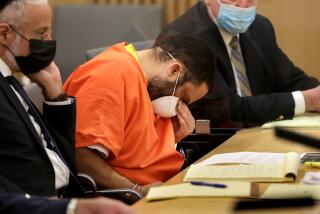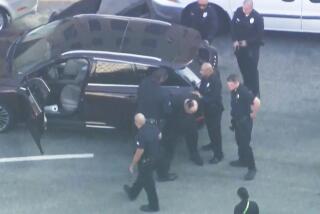Police Killer Paroled for 2nd Time, Will Live in N. Hollywood
- Share via
A Los Angeles man whose criminal record includes convictions for killing one policeman, assaulting several others and attacking a college student with a machete was paroled Wednesday--for the second time in five years.
Raymond Louis George, 36, was paroled to a North Hollywood neighborhood Wednesday from California Men’s Colony in San Luis Obispo after serving nearly three years of a four-year sentence on a weapons possession conviction, Associate Warden Gail Lewis said.
George will live in an apartment in the 11800 block of Vanowen Street, parole officials said. He is on medication for a psychiatric condition, they said.
George was originally paroled in 1984 after serving nine years of his sentence of 22 1/2 years to life for the murder and assaults. He was arrested on the weapons charge in 1985, three months after his parole had expired.
‘Not a Lot We Can Do’
Corrections officials said Wednesday they had no choice about releasing George again. “There’s not a lot we can do about it,” said Karen Bowles, an assistant regional administrator at the Department of Corrections.
Under a 1977 state law, all convicts who are not serving life sentences are entitled to parole under a formula that gives them credit for good behavior and work at prison jobs. Before that law was approved, all prisoners had to go before a parole board.
“That’s the failure of the court system, not the Department of Corrections,” Bowles said. “It’s not that we don’t care, it’s just that we’re handcuffed.”
Neither George nor his attorney could be reached for comment.
A one-time fish salesman for the Black Muslim religious sect, George was originally convicted of second-degree murder for the Oct. 21, 1974, killing of David Jack, 21, a state police officer who was guarding the former Serra State Building in downtown Los Angeles.
Woman Disabled
He was also convicted of attempting to murder two Los Angeles police officers, assaulting two Los Angeles County deputy sheriffs and an attack on a 19-year-old Occidental College student that left the woman permanently disabled. Those attacks occurred between July 14, 1974, and October 6, 1974.
His 1984 parole drew sharp criticism from law enforcement officials, who predicted that George would soon be back behind bars.
Two years later, he was. George was convicted of carrying a knife inside his pant leg and was sentenced on March 3, 1986, by Torrance Superior Court Judge William C. Beverly.
Beverly refused to comment Wednesday. But a parole official said Wednesday that George was given a relatively tough four-year sentence because of his criminal record.
Officials Doubtful
Law enforcement officials expressed doubts Wednesday about the parole. “We will probably hear from George again,” said Los Angeles Police Cmdr. William Booth. “Hopefully not, but we probably will.
“Our history with people who engage in that type of violence is that they don’t control themselves and that’s the hazard we run when they’re put back in society,” he said.
A North Hollywood resident said Wednesday he was furious to learn that George would be moving near his home.
“I’m incensed that as of today this man is going to be my neighbor,” said the man, who asked that his name not be used. “It’s right in the middle of a residential neighborhood. I think that all my neighbors should be made aware of this fact. They’re putting this killer in there and they’re not telling anybody.”
George, who has a history of psychiatric problems, was discharged after a psychiatric examination found him “totally in remission and cooperative,” said Hugh Alcott, his parole supervisor. He said that George will be under psychiatric supervision while on parole and that parole agents will visit him at home daily.
Lewis said George was found wandering the streets naked, having plunged a knife in his right eye shortly before his 1985 arrest.
Alcott, George’s parole agent in 1984, said George “seems calmer today than he ever did. He understands he’s got to keep a low profile and stay on his medication.”
“We’re very aware of his potential,” Alcott said. “The only thing I can say is we’ve got him. If he starts to decompress, we’ll send him back.”
He said George “did very well and had no problems” during his previous parole.
More to Read
Sign up for Essential California
The most important California stories and recommendations in your inbox every morning.
You may occasionally receive promotional content from the Los Angeles Times.













